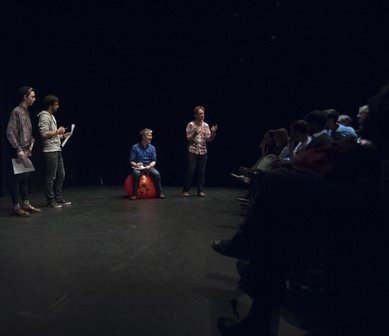Human Rights!
Bloody Human Rights!
A Queen Mary University of London public engagement project in association with Amnesty International and Menagerie Theatre Company.
2 Weeks. 7 Performances. 500 Spectactors. 10 Solutions.
1 Future.
The Trial and the issues in it
The central idea of The Trial was to follow the trail of Basanti's death and the Orissa privatisation failure to arbitration in Washington through capturing a mash up of real arbitration cases from the International Centre for the Settlement of Investment Disputes (ICSID). In situations like this where a multinational company like BEW has a asset such as its water collection contract in Orissa cancelled it is often protected by a Bilateral Investment Treaty (BIT), which allows for binding arbitration to work out a solution. It's a sort of legal insurance policy. In terms of turning this into a play the problem was that even though the issues being dealt with were really important, controversial and provocative, and a trial should have a natural tension, the original drafts were wordy, boring and overly legalistic despite redraft after redraft cutting into the text. At that point, Alan decided to represent more of a sense of how he felt about these arbitration hearings and particularly how he felt when reading the transcripts of the arbitration hearings, so an ICSID hearing is portrayed in The Trial as if it is a group of children playing a made up game (you can read more about the problems developing The Trial for performance in the "Lawyers on spacehoppers" section below).
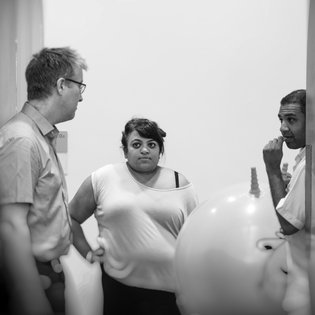
In terms of the issues, ICSID arbitration hearings are extremely controversial, with a wealth of criticisms represented here including:
- Claims of bias
- Conflicts of interest
- Illegitimate forum
- Inconsistent interpretation of the law
- Lack of public accountability
- Lack of consideration of human rights
- The self-interested role of lawyers
- Ignorance of affected community impact
The set up of the play as a circus, with children playing at being lawyers and judges, is also part of the critique of these hearings as simply making it up as they go along. It also intentionally suggests, given that just 15 arbitrators (all from the EU, US and Canada) have sat in 55% of all known investment treaty dispute hearings, that a small clique are involved in these important hearings. In terms of real world cases, The Trial is a mashup of three water privatization arbitration hearings relating to events in Bolivia, Argentina and Tanzania, plus an ongoing mining arbitration dispute in Costa Rica.
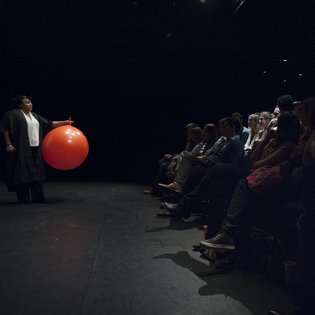
Indira although she loses the spacehopper race at the beginning quickly becomes the focus of The Trial as she rebels against the system. The point of the race is again not a frivolous one. While historically the win ratio for companies versus the government failry even, historical ratios are misleading. This is because although the ICSID has existed since 1965, there were few cases until 1996, when Bilateral Investment Treaties that exploded in the post Soviet period began triggering disputes. Since that explosion, the ratio has become more squewed in favour of the companies to stand at a 70% win ratio for companies in recent years. That is why none of the characters want to represent the Indian government. Alfons outlines the rules at the beginning – the most important of which is that only those with spacehoppers get to speak. Again, this is not a frivolous matter, but represents the exclusion of the public from this hearing, a matter Indira returns to again and again.
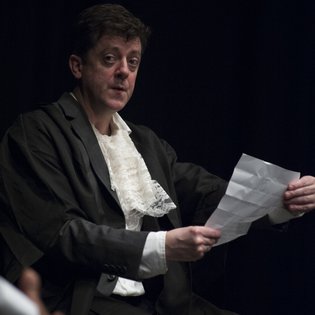
The first real item for the hearing is Indira’s objection to Alfons as President because of a conflict of interest, as BEW is a client of his law firm. Alfons, as President, considers the matter and dismisses it. Although slightly exaggerated for focus here, conflicts of interest like this are not uncommon in arbitration hearings even in some of the most high profile and controversial cases. Indira then turns to the issue of the arbitration hearing being an illegitimate forum – that is it has no jurisdiction to decide on this matter. The Indian government has no investment treaty with the UK that allows international arbitration. However, BEW has moved some companies in its group to Holland, to allow it to claim Dutch nationality and allow it to claim under a Dutch treaty with India. What seems an obviously manipulative act is allowed by Alfons. BEW is Dutch. Again this reflects decisions of real world ICSID arbitration on this matter. Therefore, the Indian government is bound to have the matter decided in Washington despite the fact the water concession granted to BEW clearly states that local law applies.
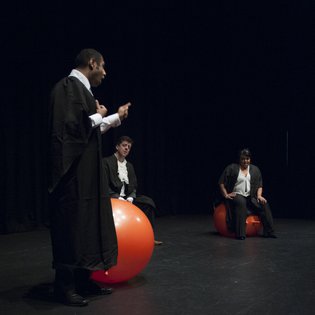
At this point, there is a comic intervention by phone from an external power inspired by the General from Dastardly and Muttley. This is intended to represent public pressure on the ICSID to allow public access. Alfons reluctantly reads a submission to the hearing from Amnesty International. The issue of public access, affected community representation and accountability has formed a major part of the criticism of the ICSID system, as it has been secretive and unaccountable for much of its history despite the significant public impact of its decisions. Its more recent compromise has been to allow, since 2007, limited submissions from affected parties called amicus briefs.
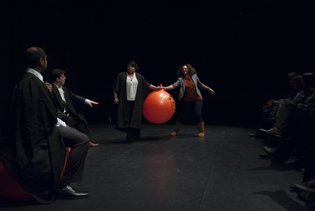
In this case, Amnesty International raises the human rights of the affected community. Peter responds that the hearing will take no account of these human rights issues unless it is required to in the investment treaty, and this Dutch investment treaty does not require it. Again, this reflects the way investment arbitration hearings treat human rights and environmental issues as matters of contract. Water as a human right or human rights abuse generally, is irrelevant here. The other issue raised is the often made point that the government, here the Indian government, represent the public interest and so no more public access or accountability is needed. However, governments do not necessarily care about the affected community in arbitration cases as the affected community may be a minority community or a community it is politically hostile to. Amnesty Internation makes the point in its submission that a compensatory monetary award to the company is likely to reward human rights abuse and mean a double punishment for the affected community as the water investment needed will be even more unlikely to come from the government.
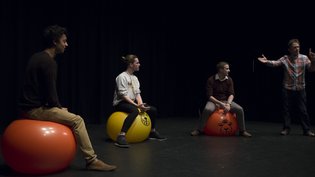
After the Amnesty International intervention, the main issue is dealt with, and it looks as though BEW will win. Indira points out that BEW is having its cake and eating it: it can through its complex and moving group structure, simultaneously deny liability for the actions of BEW India, and become Dutch to directly claim compensation for the loss of BEW India’s assets. Peter replies that, yes, it can do all these things. Shortly after this, when The Trial was performed on stage, the audience usually intervened and took over the hearing. Surprisingly, this often did not change the outcome, as the audience found it hard to escape the role and rules of the arbitration hearing even though it was in a fictional context. That was perhaps the most remarkable outcome from The Trial.
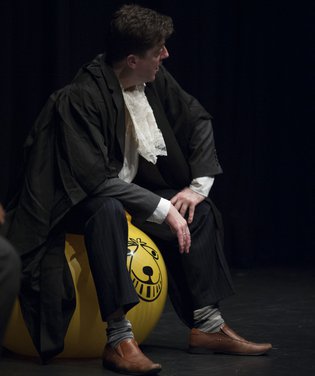
The system of investment arbitration was built in the 1960s for a world that looked very different from ours. For companies and some governments, primarily the US, it still represents the best way to deal with these disputes. In the original rehearsal script for The Trial, Alfons, the President of the hearing, gave a judgement which was subsequently cut for time reasons. It went:
"ALFONS: Ahem. ‘This arbitration process has been set up to fulfill an important role in protecting investors from powerful states like India. That is its job. This may not be popular but it is a vital part of ensuring that much needed investment flows into the developing world. Governments, both developed and developing, have the option of including human rights provisions in investment treaties. In most cases, as here, they have not done so. Additionally if they are unhappy to use international arbitration they can opt out and suffer the negative consequences for economic development.’
INDIRA: The Indian government did opt out.
PETER: Boo Hoo. We Nederlandse.
ALFONS: Ahem. ‘All this is not to say we do not care about the vulnerable but we take the view that protecting investors against powerful governments has the greater positive effect of lifting millions out of poverty. This sometimes looks callous in human rights terms but it is for the greater good. [Beat] In this matter we find for BEW."
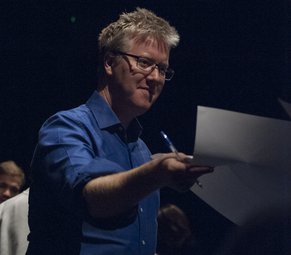
Researching The Trial
The Trial is a mashup of three very famous water privatisations that went wrong in Bolivia, Argentina and Tanzania, as well as a current mining dispute in Costa Rica. In the Bolivian case (Aguas del Tunari v. Republic of Bolivia), a water privatisation went horribly wrong in the city of Cochabamba (we encountered this case in The Well - read more here) resulting in riots, death and a state of emergency being declared. In the ICSID arbitration hearing, the switch to Dutch nationality was crucial; the tribunal found that the company could claim Dutch nationality after moving some companies to Holland, even though the Dutch government said they were not Dutch. After an enormous public outcry, the company reached a token settlement with the Bolivian Government. You can read the company's (Bechtel) perspective here. In the Argentinian example which related to emergency actions taken during the financial crisis in the late 1990s a similar dispute centred on jurisdiction was dogged by claims of conflict of interest from begining to end (Compañía de Aguas del Aconquija S.A. & Vivendi Universal v. Argentine Republic - the final decision is not publically available but the older decisions can be found here by searching for case number ARB/97/3). This resulted in Vivendi being awarded compensation worth $200 by the ICSID in 2010 after 13 years of arbitration. In Biwater Gauff (Tanzania) Ltd. v United Republic of Tanzania again a badly managed water privatisation resulted in ICSID arbitration. This case involved one of the first amicus brief interventions on human rights grounds and although Tanzania was held to have violated a BIT with the UK, Biwater was not awarded any damages as its losses were its own fault. You can read more about the Biwater case here. Costa Rica is currently the subject of a controversial pending ICSID arbitration hearing claiming $1 billion for expropriation of a gold mining concession on environmental grounds. BIT's and their ICSID arbitration system do not just affect the developing world but increasingly the developed world in the aftermath of the financial crisis that began in 2007. Given the history of ICSID in undermining national laws and courts, this has become a subject of real concern particularly given that the EU is currently negotiating an investment treaty with the US that may include ICSID arbitration. Additionally, because of issues such as those we raise in The Trial, many countries are withdrawing from existing investment treaties. For some commentators, such as the Transnational Institute and Corporate Europe Observatory, the system is irretrievably broken while others such as Santiago Montt, think it can be fixed. What is certain is that the current arrangements are no longer fit for purpose.

Do It Yourself
If you fancy yourself as an actor, director or facilitator/dificultator. Here is your big chance. Have a look at the "How it works" film here and use our script for The Trial below plus the film of the play above. You will also need three Spacehoppers - the best ones are the Science Museum ones - trust us we are battle hardened Spacehoppers pros. You can then perform The Trial and see if your audience of spectactors can fix the problems. Remember it's not just those prepared to act that are needed, you also need people who are willing to read up on the issues with the resources provided above and argue their characters case. It's important they stay in character no matter what they really believe. That said we leave it up to you as to how you do it, all we ask is that you email us here to let us know you are using the scripts and that you acknowledge the Human Rights! Bloody Human Rights! project when you perform them. Or you may simply want to have a read of the script and contemplate the issues - feel free but if you feel moved to comment let us know what you think in the comment box below.
Lawyers on spacehoppers
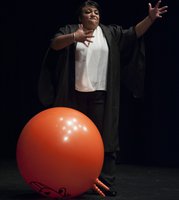
Ok, so judges and lawyers on spacehoppers – let us explain. The Trial is the play that was the most difficult to write, direct and act. It was wordy and boring in first draft and for rewrite after rewrite. The breakthrough came when Patrick and Alan were working on The Trial and Alan’s children were playing on Spacehoppers nearby. The rest was history. The hope in placing the judge and lawyers on spacehoppers was to introduce some dynamism into the wordiness of the play. If you accompany long legal passages with movement and spacehoppers you can get away with it. The spacehoppers also helped to enhance the sense of children playing a game and, in terms of reaching out to the public, made what would otherwise be a dull trial more fun at the end of a long evening (performance for Human rights! Bloody Human Rights! ran three hours - with a short break). The countdown clock judgement was added to further enhance the sense of children imagining a trial. It is also great fun at the end of a long evening. Despite all this, it still did not entirely work and Alan worked hard, with Patrick prompting, on getting it the passages shorter right up until the week of performance.
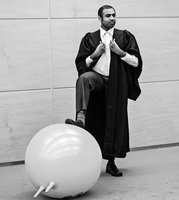
The Trial also presented a challenge in terms of how to make it interactive for the audience and we had not resolved that by the first performance despite lots of help from Ali Campbell and his students. The plan was first to have Alfons give judgment then let the audience discuss, then that changed to have Indera interupt him and bring the audience in, then that changed to have a coin toss at the end and open it to the audience to be the jury. In Belfast this did not work well, so in Dublin Patrick surprised us all by opening it up to the audience before the coin toss. This worked, and the audience piled in, throwing the actors out and taking control. One almost broke her leg running to get onstage. The film above ends as the audience takes control and produce their own judgement - often strangely the same judgement that Alan had originally scripted for Alfons as they struggled to escape the roles assigned. The Trial also presented physical problems for the actors as they had to deliver their lines on spacehoppers which did not work at times. You may notice that the lawyers stand at times when delivering lines.
If you are interested in the speed legislation our audiences came up with click here, or if you want to see Alan and Patricks' afterthoughts first and read Alan's Tour Diary click here.
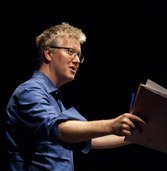
Tell us what you think
The driving ambition behind the Human Rights! Bloody Human Rights! project was a shared need by Professor Alan Dignam and Amnesty International to raise public awareness of important but complex aspects of business involvement in Human Rights abuse. This is the outcome.
If you performed The Trial tell us about your experience and your solutions or if you just enjoyed watching and reading and want to comment generally, feel free to leave a comment on our home page. Business and Government engagement on the issues raised here will only increase if public pressure is brought. That future starts with you.
Copyright © Professor Alan Dignam All Rights Reserved
